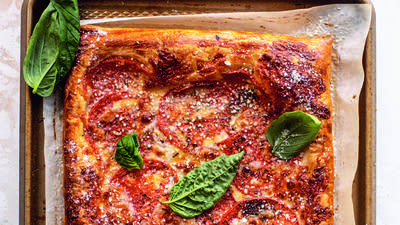
With the rise of Yelp, just how relevant are food critics? Sally Swift asked one of the best, Tom Sietsema of the Washington Post.
Sally Swift: I want to talk about the role of a food critic these days. Is it a viable job with everything that goes on on the Web and everyone weighing in? What is your take?
Tom Sietsema: I sure hope that's the case. A long time ago, I apologized for being a food writer, but I discovered that, with food, you can write about politics, you can write about health, you can write about finance and economics. It's open to so many different ways of reporting and telling good stories.
When it comes down to it, I know some critics are worried about Yelp or other forms of social media where restaurants and establishments are reviewed, but I think food criticism is more important than ever right now because there's so much noise out there, and there are fewer people. I am lucky, as is Pete Wells at The New York Times and a handful of other critics around the country, because we have employers who let us go multiple times to restaurants, who allow us to scout restaurants and maybe never write about them, who allow us to go back and take people with us, and they pay. They foot those bills, and they are not inexpensive. When you do something like this, it is a serious commitment of time and resources.
Whether or not I agree with a given critic, I think paid restaurant critics are really important right now because you can go online and see what their bios are, what they've written in the past. You can see an entire body of work, and hopefully The New York Times, The Washington Post, and other large publications are supporting these people, or they wouldn't be there.
SS: What do you think the impact of Yelp reviews and the like have been on restaurants?
TS: I think they drive restaurants crazy. I hear this repeatedly, and maybe it's because people who are angry or upset about something complain the loudest, but as a layperson, it takes so much work to go through Yelp reviews and discern who's good and who's bad. Finding someone who's good and following that person's opinion takes work.
I always look at some with too many exclamation marks, poor spelling, or, "This is the best French onion soup I've ever had!" You want to know where this person has eaten French onion soup. Have they been to France? Have they cooked it? These are all details that help inform opinions, and it's too much work for the average person.
SS: It is too much work.
 Related: How critic Tom Sietsema selected the top 10 food cities in the US
Related: How critic Tom Sietsema selected the top 10 food cities in the US
TS: We're all time-pressed, but isn't it easier to have a critic with a track record than someone whose background you don't know?
SS: Whose food criticism do you like, and who do you admire?
TS: My predecessor, Phyllis Richman. She was my mentor. I would have to list her.
SS: She wrote for The Post.
TS: She was there for an astounding 23 years. Boy, those were big pumps to fill.
SS: She wielded power. There's no doubt about it.
TS: She really did. She was both a food critic and the Food Editor at the time, and I was her assistant. I really credit her. She had a lovely voice, and she was a real champion for the underdog and for just good food. She wasn't one of these critics who only wanted to eat in high-end places. In fact, she told me that if she were to do it all over again, she'd want to be the cheap eats critic, and I admire her for that. She had a good sense of humor, she was always inquisitive, and she asked good questions. I think Jonathan Gold, obviously--he won a Pulitzer Prize for his work--is really good.
SS: Who also loves cheap eats, interestingly enough.
TS: What do they tell us? Write about what you know, and he's really made a career for himself, eating low on the food scale there. Ruth Reichl--I think her stuff is just really poetic. Going way far back, I was a fan of Mimi Sheraton back when she was the food critic for The New York Times. I could go on and on. It's just a really hard thing to do well because, basically, you're writing about what you're putting in your mouth and chewing, and how to make that come alive week after week.
SS: Be relevant.
TS: Be relevant, stay on point, be fair, be funny. I think it's really important to be a good read, though. The food stuff you can learn. It's like being a good waiter--I would hire the person who has the better personality and fewer skills than the person who has more skills and not much of a personality. It doesn't matter how much you know about food; if you can't spin a good tale for readers, no one's going to follow you.
Before you go...
Each week, The Splendid Table brings you stories that expand your world view, inspire you to try something new, and show how food connects us all. We rely on your generous support. For as little as $5 a month, you can have a lasting impact on The Splendid Table. And, when you donate, you’ll join a community of like-minded individuals who love good food, good conversation, and kitchen companionship. Show your love for The Splendid Table with a gift today.
Thank you for your support.
Donate today for as little as $5.00 a month. Your gift only takes a few minutes and has a lasting impact on The Splendid Table and you'll be welcomed into The Splendid Table Co-op.




